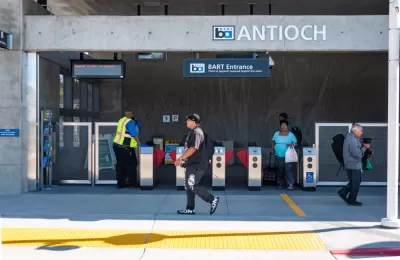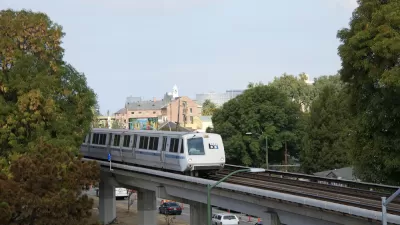Amidst fierce opposition from East Bay cities who want to control the destiny of BART parking lots in their jurisdictions, Assembly Bill 2923, which would partially preempt local land use authority, passed a critical committee last Thursday.

Assemblyman David Chiu (D-San Francisco) and his co-sponsor, Concord Democratic Assemblyman Timothy Grayson, envision BART parking lots as being more than broad swaths of asphalt to store commuters' private vehicles during the day while remaining largely vacant at night. Instead, they see these lots as a resource to address both the housing crisis and regional traffic congestion if replaced by modern transit-oriented developments.
While not nearly as high-profile as another bill this year that would have preempted local land use authority on a much broader and deeper level, SB 827: transit-rich housing bonus by Sen. Scott Wiener (D-San Francisco), Assembly Bill 2923 has generated significant controversy in the East Bay.
"Though others share [Chiu's and Grayson's] vision, development of BART parking lots is a contentious issue: Bickering over height limits, aesthetics and parking spaces has long hobbled the transit agency’s ability to get it done," reports Rachel Swan for the San Francisco Chronicle on Wednesday, Aug. 15.
Fierce opposition from mayors, city councils and neighborhood groups has cast the future of Assembly Bill 2923 in doubt as it faces a live-or-die vote in a state Senate fiscal committee Thursday.
The contentious bill passed the critical Senate Appropriations Committee on a 5-2 vote and now heads to the full Senate Floor. The Assembly barely passed AB 2923, with only one vote to spare, on May 31.
Swan explains the resistance.
“I think everybody agrees that we need to have more housing in the Bay Area,” said Orinda Mayor Amy Worth. “Our issue is with BART having land-use authority over cities.”
Throughout Alameda and Contra Costa counties, the arguments are similar. Nearly everyone seems to agree on the virtues of transit-oriented development, which would add vital housing stock and ease pressure on jammed freeways. Yet many cities want to fill this land on their own time and their own terms, without BART or state legislators calling the shots.
It's not just city leaders that have a problem with the bill; so does the 9-member BART Board of Directors which has taken a neutral position, adds Swan.
Nick Josefowitz, who represents San Francisco [and is a candidate for Supervisor], helped craft the bill and remains a vocal supporter. Three other board directors — Debora Allen, John McPartland and Thomas Blalock — wrote a letter in dissent, saying BART’s job is “transit, not housing.”
Swan goes into detail on local opposition to development at parking lots of the Ashby and North Berkeley stations.
See three additional posts on this legislation under legislative tag AB 2923.
FULL STORY: Housing on BART land has been a third-rail issue. Will this effort be different?

Maui's Vacation Rental Debate Turns Ugly
Verbal attacks, misinformation campaigns and fistfights plague a high-stakes debate to convert thousands of vacation rentals into long-term housing.

Planetizen Federal Action Tracker
A weekly monitor of how Trump’s orders and actions are impacting planners and planning in America.

San Francisco Suspends Traffic Calming Amidst Record Deaths
Citing “a challenging fiscal landscape,” the city will cease the program on the heels of 42 traffic deaths, including 24 pedestrians.

Adaptive Reuse Will Create Housing in a Suburban Texas Strip Mall
A developer is reimagining a strip mall property as a mixed-use complex with housing and retail.

Study: Anti-Homelessness Laws Don’t Work
Research shows that punitive measures that criminalized unhoused people don’t help reduce homelessness.

In U.S., Urban Gondolas Face Uphill Battle
Cities in Latin America and Europe have embraced aerial transitways — AKA gondolas — as sustainable, convenient urban transport, especially in tricky geographies. American cities have yet to catch up.
Urban Design for Planners 1: Software Tools
This six-course series explores essential urban design concepts using open source software and equips planners with the tools they need to participate fully in the urban design process.
Planning for Universal Design
Learn the tools for implementing Universal Design in planning regulations.
Heyer Gruel & Associates PA
JM Goldson LLC
Custer County Colorado
City of Camden Redevelopment Agency
City of Astoria
Transportation Research & Education Center (TREC) at Portland State University
Jefferson Parish Government
Camden Redevelopment Agency
City of Claremont





























